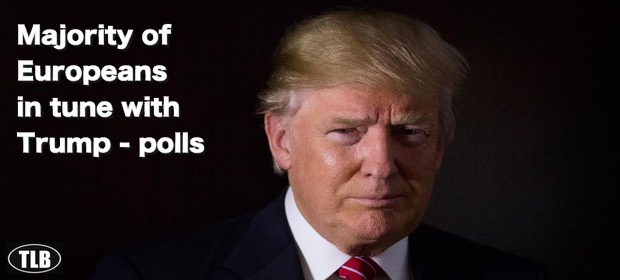
‘Sobering’ poll finds European support for Trump’s Muslim ban
ESZTER ZALAN
The majority of Europeans, according to a poll of more than 10,000 people in 10 EU countries, would support a Trump-style ban on migration from mainly Muslim countries.
The London-based think tank, Chatham House, conducted the poll before US president Donald Trump’s executive order was announced and asked if immigration from Muslim-majority countries should be stopped.

An average of 55 percent of those surveyed agreed, 25 percent neither agreed nor disagreed and 20 percent disagreed, the poll, published on Tuesday, (7 February) said.
According to the survey, 71 percent of people in Poland, 65 percent Austria, 64 percent in Hungary and Belgium, and 61 percent in France agreed.
Support was also high in Greece (58%), Germany (53%), Italy (51%), the UK (47%) and Spain (41%).
Chatham House called the findings “striking and sobering”.
“They [the results] suggest that public opposition to any further migration from predominantly Muslim states is by no means confined to Trump’s electorate in the US but is fairly widespread,” it said in a statement.
Most of these countries have been central in the migration crisis, or have seen terrorist attacks over the last years, and the radical right is part of their political scene, Chatham House pointed out.
Support for the ban was stronger among older populations, with only 44 percent of people aged 18-29 being in favour, while 63 percent of those older than 60 said they agreed with a ban.
The notion of a ban was more popular with men and those living in rural areas. Urban dwellers and female respondents were less likely to support the move.
 Education was also a dividing factor: of those with secondary level qualifications 59 percent opposed further Muslim immigration, while less than half of all degree holders supported further migration curbs.
Education was also a dividing factor: of those with secondary level qualifications 59 percent opposed further Muslim immigration, while less than half of all degree holders supported further migration curbs.
European leaders have slammed Trump’s immigration ban from seven mainly Muslim countries, while leaders of Europe’s populist right-wing parties (pictured) have praised the move.
Lack of faith
Another recent survey also showed that 80 percent of respondents have lost confidence in political parties, and the media, and are looking for strong leaders who break rules.
The worldwide survey conducted online by Ipsos targeted adults under 65 in Argentina, Australia, Belgium, Brazil, Canada, France, Britain, Germany, Hungary, India, Israel, Italy, Japan, Mexico, Peru, Poland, Serbia, South Africa, South Korea, Spain, Sweden, Turkey and the United States.
The results, published in late January, showed that people say they were more likely to support a party or political leader who promised radical change.
European respondents participating in the survey generally lacked trust in international institutions.
After the eurozone turmoil and bank bailouts, people also lacked faith in banks, with Spain and Italy leading the way, on 92 and 80 percent, respectively, followed by Germany on 75 percent.
People tended to distrust the justice system as well, although to a lesser degree, with Spain, Hungary, Italy, and Poland being the most sceptical among the surveyed European nations.
Lack of confidence in the media was also well above 50 percent in the European countries participating in the poll.
 In Hungary, where prime minister Viktor Orban’s (pictured) ruling Fidesz has dominated the media landscape, respondents distrusted the media the most, with 87 percent saying they lack confidence.
In Hungary, where prime minister Viktor Orban’s (pictured) ruling Fidesz has dominated the media landscape, respondents distrusted the media the most, with 87 percent saying they lack confidence.
Seventy five percent of British respondents also said they do not trust their media.
Most respondents had no confidence in their government either, with Spain distrusting their political leadership with 89 percent. Polish and Hungarian respondents also said (82 percent) that they do not trust their governments.
In all European countries participating in the survey, over 70 percent of the respondents said they did not trust political parties.
Outspoken leaders
No surprise then that a high proportion of people was more likely to vote for a political party or leader that stood up for common people against the elite, and that around half were attracted to political parties and leaders promising to upset the status quo. The same group would support a leader who offends others, but speaks his/her mind.
With the presidential election campaign heating up in France, where far-right leader Marine Le Pen is a front-runner, 80 percent of French respondents said they want a “strong leader who breaks the rules”.
In some European countries, which have been victims of terrorist attacks, like Belgium and France, people favour “stopping terrorism over protecting civil rights”. In Germany, only 40 percent supported that notion.
Around half of the people in Hungary, Belgium, and Italy thought that their country would be stronger if immigration was stopped, a curious result in Hungary where there is virtually no immigration, as last year it granted asylum protection to just 432 people, according to official figures.
************
ER recommends other articles by EUobserver
 Find out about our great (WOW) TLB Project Membership package and benefits, add your voice and help us to change the world!
Find out about our great (WOW) TLB Project Membership package and benefits, add your voice and help us to change the world!




